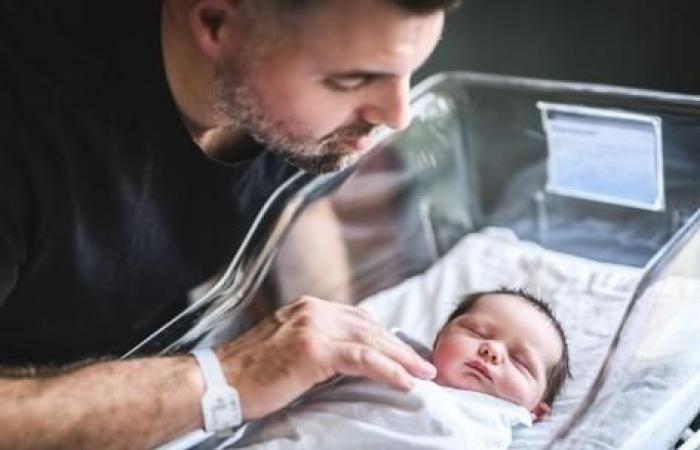THE ESSENTIAL
- A new scientific study shows that pregnancy also changes fathers’ brains, particularly in regions associated with empathy, attachment and parental care.
- These neurological transformations, influenced by interactions with the infant, illustrate how parenting is not only biological but also shaped by experience and environment.
- “Fathers begin to experience brain changes as soon as their partner becomes pregnant.”
When a woman is pregnant, her body and brain undergo significant changes, largely influenced by hormones. This idea is well anchored in the collective imagination. But a question remains: what about fathers? Few studies have looked at how pregnancy and birth affect their brains. However, it seems that these changes also exist in men, and that they are far from negligible.
Dr Lucie Joly, psychiatrist specializing in perinatal psychiatry and women’s health, author and teacher at Sorbonne University, recently co-wrote an article published in the journal JAMA PSY with her colleague Dr Hugo Bottemanne on this fascinating subject.
Mothers’ brains reorganize from the first moments of pregnancy
In pregnant women, brain changes appear from the start of pregnancy. They are mainly caused by hormones like estrogen and progesterone, leading to a real “brain reorganization”. This phenomenon, which we call “perinatal neuroplasticity”, allows the brain to adapt to future parenthood.
Dr Joly explains: “During pregnancy, hormonal changes induce neurobiological adjustments that modify certain brain functions. These adaptations are crucial to optimize the management of emotions and the response to the infant’s needs from the first weeks postpartum.”
Certain areas of the brain, linked to empathy, emotional regulation and social cognition, will be modified. For example, “perception of emotions facials becomes finer, and vigilance towards the infant’s needs increases. Women can therefore better decipher signs of distress or their baby’s needs.”. But that’s not all.
Fathers also experience brain changes
If mothers’ brain changes are well documented, the same goes for fathers, even if research in this area is (far too) recent. Dr Lucie Joly indicates that these transformations are not due to the same physiological mechanisms as those of mothers, but they nevertheless exist.
“Fathers begin to experience brain changes as soon as their partner becomes pregnant. It’s a process that develops slowly, but would have a huge impact on their ability to interact with their baby“, she explains. Although these changes are still poorly understood, several recent studies show that specific regions of the brains of fathers activate in a similar way to those of mothers after birth. These areas are linked to empathy, emotion regulation and attachment For example, the drop in testosterone during pregnancy could contribute to this brain transformation.
More empathetic and sensitive fathers
The brain changes seen in fathers appear to make them better prepared to care for their babies. Dr. Joly notes: “Pregnancy alters fathers’ neural circuits, and this results in increased empathy and greater sensitivity to the infant’s needs.“She confirms that studies have shown that high levels of oxytocin, often called “the love hormone“, promote better quality of parental care. This hormone, which plays a key role in attachment, would allow fathers to interact better with their child.
Pregnancy therefore has a much more profound impact than one might imagine, not only on mothers but also on fathers. Men’s involvement in this transition period seems to have a direct effect on their parental behavior and their ability to form strong bonds with their baby.
Postpartum depression in fathers is often overlooked
These brain changes can also make fathers more vulnerable to disorders like postpartum depression. Dr Joly mentions that 8 to 10% of fathers experience a form of depression in the year following childbirth. “This phenomenon is very real, but often minimized. Fathers who are going through emotional difficulties may suffer in silence, as society tends to focus more on the mother“, she indicates. These disorders can have repercussions on the baby’s development: “We must reassess the father’s place in postnatal care. Offering specific support to fathers is essential, as their mental well-being is just as important to the overall health of the family“, insists Dr. Joly.
The first scientific studies of fathers’ brain changes show that there is a need to further explore this area. Dr Lucie Joly and her colleagues are calling for better inclusion of fathers in perinatal neuroscience studies. “It is fundamental to better understand these brain transformations, because they have a direct impact on the way fathers experience parenthood and engage with their child.“, she concludes.






